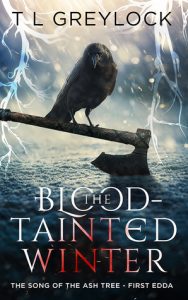The Blood-Tainted Winter by T. L. Greylock
“Dark are the hearts of men, and easily tempted.”
Raef Skallagrim is not a happy bunny. All he wants to do is go on a sea trip with his mates. He’s been looking forward to all it entails for ages: drinking, raiding, pillaging, ‘boys will be boys’ fun and games. Making memories, y’know?
 But Raef also happens to be the only son of the lord of Vannheim. Now, Skallagrim Sr. is normally pretty chill, but he puts his foot down big time when the Boss calls a national snap election. When everything at said election goes tits up for Raef and his father (and everyone, really), Raef realises he has some growing up to do. Life isn’t always about getting what you want (at least, not right away). Bad things happen to good people . . . and, as if betrayal and civil war weren’t enough, someone forgot to let the gods know that they’re not invited.
But Raef also happens to be the only son of the lord of Vannheim. Now, Skallagrim Sr. is normally pretty chill, but he puts his foot down big time when the Boss calls a national snap election. When everything at said election goes tits up for Raef and his father (and everyone, really), Raef realises he has some growing up to do. Life isn’t always about getting what you want (at least, not right away). Bad things happen to good people . . . and, as if betrayal and civil war weren’t enough, someone forgot to let the gods know that they’re not invited.
The Blood-Tainted Winter has everything SFF readers could possibly want, and more. A Norse fantasy as epic as it is immersive, T. L. Greylock’s debut tells of feuds and friendships (and more feuds) amid legends of devils and deities that arise as organically from the evocative Scandinavian vistas as steam from a geyser. While Greylock’s novel might be more ‘axes and intrigue’ than ‘sword and sorcery’, that’s not to say it doesn’t contain plenty of both – though the magic is relatively low key, at least to begin with. Rather than fireballs and flying, the magic of The Blood-Tainted Winter is an insidious but natural part of a world where demigods also tend to keep a pretty low profile.
For their own safety as much as anyone else’s.
Speaking of gods: no doubt you’ll recognise a few of the names mentioned throughout this story. Odin, of course; Loki, too, as well as others such as Heimdall and the Valkyries. The Blood-Tainted Winter isn’t self-conscious of itself as a Norse fantasy, yet Raef’s tale evokes a vivid sense of place and time that thoroughly immerses the reader in a land of gods, battle and betrayal. Greylock doesn’t force the Norseness so much as nurture it, weaving familiar aspects of the mythology into the book in a way that doesn’t dominate or overshadow the story being told.
You could argue that the book’s beginning is a little too leisurely; however, I enjoyed having the opportunity to get to know the protagonist a little better – and to feel pleasantly surprised and intrigued when the following chapters have him reacting in a most unexpected manner. I will say that Greylock does a wonderful job of patiently unfolding the story through the eyes of its protagonist. Raef is distant and, at times, unfathomable (though not unlikeable), functioning more as a window onto events than as someone the reader can sympathise with or live vicariously through.
This is fitting with Raef’s role as a reluctant but competent leader, one who I suspect is destined to grow into a legend.
Greylock’s debut novel is strongly reminiscent of John Gwynne’s excellent epic fantasy series, The Faithful and the Fallen. And just as Corban had Dath and Farrell (and Arthur had Merlin and Gwen!), so Raef has Vakre and Siv – for what is a leader without his companions?
The Blood-Tainted Winter was an entry in last year’s Self-Published Fantasy Blog-Off, and was eliminated quite early on. Frankly, I’m astounded it didn’t make more of a splash (though, to be fair, it had stiff competition in the first round from the likes of Benedict Patrick’s They Mostly Come out at Night and eventual fourth-place finalist Fionn: Defence of Ráth Bládhma by Brian O’Sullivan).
Trust me, though: this is a singularly kickass novel. T. L. Greylock is one to watch, and I hope you’ll all be joining me when the time comes to delve further into the Song of the Ash Tree saga.


[…] Ash Tree as a box set is so exciting for me. It’s been nice to revisit the trilogy—after all, The Blood-Tainted Winter was published nearly four years ago!—while bridging the gap between that series and my next book, […]